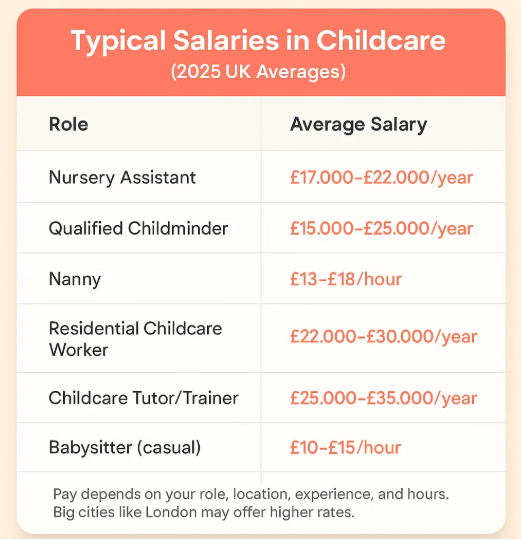If you love spending time with children and want a job that really makes a difference, childcare might be the perfect fit. You don’t always need a degree to become a childcare worker — but most employers ask for at least a Level 2 Certificate in Childcare or Early Years Education. In this guide, we’ll explain clearly what you need, what each job is like, and how to begin. Whether you’re fresh out of school or thinking about a job change, here’s everything you need to know.
What Qualifications Do You Need to Be a Childcare Worker?
To work in childcare in the UK, you need at least a Level 2 childcare qualification. This could be a CACHE Level 2 Certificate in Childcare, or a City & Guilds similar course. Most nurseries and early years places expect this as a basic starting point. Some jobs only need a Level 1 or even no training if you’re working with support. But for growing in your job, a Level 2 or 3 is the best choice.
Here’s what you need to get started:
- Level 2 Certificate in Childcare or Early Years
- Enhanced DBS check (to show you can work safely with children)
- Paediatric First Aid certificate (especially for jobs with babies or under 5)
- Work experience or placement (often part of the training)
You can get these through college, apprenticeships, or online courses. Many people start with a short Level 1 course and move up from there.
Childcare Career Paths: Choose What Suits You
Childcare is not the same for everyone. There are different paths to choose from depending on your strengths, daily life, and goals. Here are the most common jobs:
Nursery Assistant or Early Years Practitioner
This is the most common starting point. You’ll work in a nursery, preschool, or reception class. Your job is to help children learn through play, help with meals and keeping clean, and make sure the place is safe and fun.
The starting pay is around £17,000 to £22,000 a year. The best qualifications for this job are Level 2 or 3 in Early Years Education. You’ll usually work in nurseries, preschools, or school settings. Many people use this job to get experience and move up to Room Leader or Nursery Manager.
Childminder (Self-Employed)
Childminders care for children in their own homes. It’s a good fit if you want to work for yourself. You must register with Ofsted if you look after children under 8 for money.
To register, you need:
- Paediatric First Aid training
- Childminder-specific training (usually Level 3 or similar)
- Enhanced DBS check
- Public liability insurance
You can earn between £15,000 and £25,000 a year, depending on how many children you care for.
Nanny (In the Child’s Home)
Nannies care for children in the family’s home. Some live in, others come daily. Signing up with Ofsted is not required but can help families trust you more.
To work as a nanny, you should have a Level 3 childcare qualification, first aid training, and a DBS check. You can earn between £13 and £18 per hour on average. This job gives you flexibility and close connections with families.
Residential Childcare Worker (Children’s Homes)
This is a more focused job. You’ll work in homes with children who may have had hard lives. It’s rewarding but can also be emotionally tough.
You’ll need a Level 3 Diploma in Residential Childcare, experience with children who need extra help, and a DBS check and references. You can earn between £22,000 and £30,000 a year. You’ll work in shifts, including weekends and nights.
Childcare Tutor or Trainer
This job is for people who want to teach others about childcare. You’ll train new learners or apprentices.
You’ll need:
- Level 3 or higher in Childcare
- Teaching qualification (like Level 3 Award in Education and Training)
- Experience working in childcare
The average pay is between £25,000 and £35,000 a year. If you enjoy helping others learn, this could be for you.
Entry Routes: How to Start Your Childcare Journey
Apprenticeships
Apprenticeships are a great way to earn money while you learn. You work in a real childcare setting and study at the same time. The most common ones are Early Years Practitioner (Level 2) and Early Years Educator (Level 3). These take 12 to 24 months to finish. You’ll end with a well-known qualification and work experience.
College Courses
Colleges offer full-time courses in Childcare and Early Years. Many include placements. You can start with Level 1 Award in Caring for Children (Introductory), Level 2 Certificate in Childcare, or Level 3 Diploma in Early Years Education. If you’re not sure which level is best for you, talk to your local college. They’ll help you find the right course.
Online Training
Some places offer flexible online learning. This is great if you need to fit study around a job or family. Make sure the course is recognised (CACHE, City & Guilds, NCFE). Some free courses are paid for by the government for certain people.
Legal and Safety Requirements
To work with children, the law needs a few checks and certificates. An Enhanced DBS check looks at your criminal record and shows you can work safely. First aid training is very important, especially in nurseries or with babies. Safeguarding training shows you how to see signs of harm or neglect. If you register with Ofsted (like as a childminder), they will visit and check your home and training too.
What Qualifications Do You Need to Be a Childcare Worker Without Experience?
You don’t need years of experience to start. Many jobs welcome beginners. A Level 1 or Level 2 course is the best place to begin. Volunteering in a nursery or after-school club also helps you build skills and confidence.
You could help at a local nursery one morning a week. Babysit for family or friends and get a DBS check if you can. Take a free online course in child development or safeguarding. Small steps lead to big changes.
Becoming a Child Carer for Your Own Child
If your child has extra needs and you care for them full-time, you might be called a carer. You don’t need qualifications, but you can still get support. You might get Carer’s Allowance (£83.30/week in 2025), Child Disability Living Allowance, and help from your council like short breaks or support groups.
To apply, visit the GOV.UK website and search for Carer’s Allowance. You’ll need to show you care for your child at least 35 hours a week. You can also take free courses to build skills. Some charities offer training in handling behaviour, supporting learning needs, and simple health care skills. This helps you feel more sure and supported at home.
Typical Salaries in Childcare (2025 UK Averages)

Keep Learning: Progression and CPD
Even after you qualify, learning doesn’t stop. Most childcare jobs ask you to keep your training up to date. This includes yearly first-aid training, new safeguarding rules, and courses on child development, SEN, or behaviour support.
You can also move up in your job. Become a Room Leader or Deputy Manager. Train as an Assessor or Tutor. Focus on SEND or speech and language support. There are always new steps in childcare.
Final Thoughts: Your First Step Starts Now
Starting a job in childcare is a big step, but it’s also a meaningful one. Kids need safe, caring adults to help them grow. Whether you want to work in a nursery, start your own childminding business, or care for your child at home, there’s a way for you.
Remember the key question: what qualifications do you need to be a childcare worker? Usually, a Level 2 or 3 childcare certificate, a DBS check, and first aid are the must-haves. Everything else builds from there.
So choose your path, get qualified, and start making a difference — one small person at a time.
Take your first step into childcare with ease—join our beginner-friendly online Child Care courses at Unified Course and get qualified your way!




